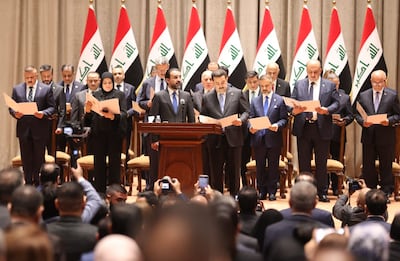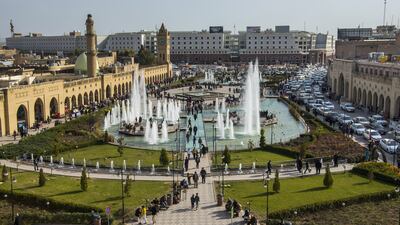Iraq has released a US citizen held by authorities in Erbil for 11 weeks, several sources have told The National.
Earlier this week, media outlets linked to Iran-backed militias in Iraq said a dual national citizen, whose name was reported by sources only as SF Shaker, had been detained on suspicion of working with the CIA. Iraq's Supreme Judicial Council confirmed his release on Thursday, following a request for comment.
Mr Shaker, who writes under the pseudonym Anwar Al Zamani, was arrested on August 13 in the capital of the semi-autonomous Kurdish region at the request of Iraq’s federal government in Baghdad.
His full name has been withheld for security reasons.
Mr Shaker was accused of extortion and espionage, among other charges, but sources close to the case say charges were baseless and he was investigating political influence within Iraq’s judiciary.
One source described the accusation of spying — a charge that can carry the death penalty — as “completely baseless”.
Another source said Mr Shaker attracted the suspicion of authorities after making inquiries about political influence in the Supreme Judicial Council, which has made a number of key rulings this year that helped Iran-linked parties form a government in October.

Analysts following the case worry that, in addition to violently opposing dissent from Iraqis, pro-Iran militant factions in the country are increasingly targeting foreigners, after the murder of a US aid worker in Baghdad earlier this month.
A US State Department spokesperson confirmed the US government was aware of Mr Shaker's detention but declined to give more details or confirm his release.
"We are aware of the detention of a US citizen in Erbil, Iraq," a statement said.
"The US Department of State and our embassies and consulates abroad have no greater priority than the safety and security of US citizens overseas," it continued. No further details were provided.
Last week, a senior security official in the Iraqi government told The National that they were aware of a US citizen who had been detained and that negotiations were under way to secure his release.
Sources said that Mr Shaker’s release comes after weeks of careful negotiations between the US State Department and Iraqi authorities.
They added that Mr Shaker is no longer in Iraq and has been reunited with his family. His location has not been disclosed.
Mr Shaker has written several articles about Iraq for the Washington Institute for Near East Policy that are critical of Iranian influence in Iraq. One source said he had previously travelled to Iraq to research the country's judiciary.
News of his detention comes weeks after US aid worker Stephen Troell was shot dead in Baghdad. Following his murder, several pro-Iran news outlets claimed that Mr Troell, who ran a school with his family, was a spy.
Militias in the Popular Mobilisation Forces, an alliance that includes armed groups linked to Iran, have killed at least 500 protesters and activists since 2019, accusing them of working for foreign agendas.
‘Politically motivated’ arrests
Authorities in Erbil held Mr Shaker on charges of attempting to extort a senior official in the judiciary, as well as espionage, an accusation that was later dropped.
However, a source in the US who worked on trying to secure his release told The National that Mr Shaker was the victim of “entrapment” and was “lured to Iraq to discuss a business partnership”.
The source said Mr Shaker was about to fly to Baghdad before receiving a warning that Iran-backed militias wished to detain him. He then travelled to Erbil, where he was arrested.
Kurdish authorities in Erbil complied with Iraqi federal law in detaining Mr Shaker amid increasing federal government pressure to curtail the region’s semi-autonomous status.
Allies of Iraq's new Prime Minister Mohammed Shia Al Sudani, who is aligned with several Iran-backed parties, recently pushed to invalidate Kurdish government oil contracts following a supreme court ruling, while the court also struck down the presidential nomination put forward by the KDP, the main Kurdish party.
In pictures: key political figures in Iraq
Safeen Dizayee, a foreign relations representative for the Kurdish Regional Government in Erbil denied any knowledge of Mr Shaker’s detention.
Analysts say that Mr Shaker’s detention points to an increasing use of corruption accusations to ensnare political rivals in Iraq, and an increasingly acrimonious climate where suspicion of graft runs high on all sides.
“Iraq suffers from a law enforcement and judicial system that’s unreliable and politicised,” said Omar Al Nidawi, an analyst with the Enabling Peace in Iraq Centre.
Mr Al Nidawi said a key problem was the “selective application of justice that merely targets opponents while turning a blind eye to wrongdoing by allies, undermining reliable and even-handed law enforcement”.
This puts the new government’s anti-corruption efforts on shaky ground.
“There is certainly every indication that his anti-corruption campaign is not going to threaten the establishment,” said Kirk Sowell, who runs Utica Risk, an Iraq-focused consultancy.
“For example, Hadi Al Amiri ally Hayder Zayar has been appointed as head of the Integrity Commission.”
Mr Al Amiri is a senior figure in Iraq's PMF, whose Badr Organisation has been implicated in a number of corruption scandals in Iraq, including oil smuggling and illegal taxation at militia checkpoints. The Integrity Commission is Iraq's main anti-corruption body.
“The nature of corruption in Iraq is that it's politically sanctioned, it's part of the political process, part of negotiations and power politics,” said Renad Mansour, an expert at London's Chatham House who has extensively researched corruption in Iraq.
“Every prime minister, every minister, everyone involved in the government has to play a certain game, and that game is the politicisation of corruption.”
Mr Shaker drawn into Iraq’s election chaos
While Iraq’s government has not issued any statements about Mr Shaker’s detention, Iran-backed militia media outlets have published numerous reports claiming he tried to extort the head of the supreme judicial council, which has played a key role influencing the formation of the government this year.
Al Ahad and Sabreen said Mr Shaker had worked “with the CIA”.
Both are linked to US-designated terrorist organisation Asaib Ahl Al Haq, along with its political front, Sadiqun.
The accusations against Mr Shaker, as publicised by pro-militia outlets, revolve around the contentious government formation process. It was not immediately clear why Mr Shaker would be involved in this process.
Following Iraq’s elections in October 2021, Shiite cleric Moqtada Al Sadr took the lion’s share of parliament seats but was frustrated in his efforts to form a government by pro-Iran rivals.
Al Ahad news reported Mr Shaker had informed Chief Justice Faiq Zaidan of an effort to unseat him, led by an alliance between Mr Al Sadr, the Kurdish KDP and two large Sunni parties.
Approached for comment, Iraq's Supreme Judicial Council confirmed Mr Shaker's release, saying there was a "lack of evidence" to keep him detained, but would not comment on allegations.
Mr Zaidan had issued a number of rulings after the election that Mr Al Sadr’s coalition said made it harder for his alliance to form a government, including raising the number of MPs a bloc needs to elect a president.
Al Ahad then alleged that Mr Shaker had asked officials in the Supreme Judicial Council for $20 million for him to use his influence with the CIA to block Mr Al Sadr’s alliance from removing him from the court.
With no formal role in Iraqi politics, it is unclear how Mr Shaker could have such influence.
Mr Al Sadr’s alliance fell apart in the face of numerous legal and political roadblocks and tension escalated into a three-way street battle on August 29 in the secure government Green Zone.
The confrontation between Iran-backed militias, Mr Al Sadr’s followers and the Iraqi army left at least 23 dead and hundreds injured.
Mr Al Sadr had previously withdrawn his MPs from parliament, partly in protest against judicial interference in government formation, while the KDP left his coalition and joined forces with pro-Iran factions.












